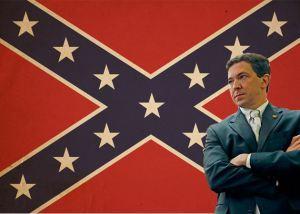
Chris McDaniel
By Alan Bean
Chris McDaniel, a Mississippi Tea Party candidate vying for Thad Cochran’s senate seat, wants to turn back the hands of time.
“There are millions of us who feel like strangers in this land, an older America passing away, a new America rising to take its place,” McDaniel said this past week. “We recoil from that culture. It’s foreign to us. It’s alien to us. … It’s time to stand and fight. It’s time to defend our way of life again.”
This revealing remark is the frontispiece for an AP story that was picked up by the Huffington Post and Breitbart.com, suggesting that conservatives and liberals attach significance to McDaniel’s words, though for different reasons.
We often distinguish liberals from conservatives using an economic metric: liberals think capitalism works best when checked by government regulation supplemented by public projects and a robust social safety net; conservatives think capitalism works best without regulation and see unrestricted free markets as want to privatize every public initiative, with the partial exception of the military.
On the surface, Chris McDaniel’s rhetoric fits this pattern. He says the government has no constitutional right to educate the nation’s children. On the stump, he sounds like a typical small government, low tax conservative.
But there is more to the Tea Party phenomenon than low tax-small government conservatism. “There are millions of us who feel like strangers in this land,” McDaniel says, “an older America passing away, a new America rising to take its place.”
Unless McDaniel and his confederates smothers this new America in the cradle.
Liberals and conservatives are divide over diversity more than economics. Liberals embrace a diverse America comprised of different races, religions, genders and sexual orientations. Conservatives pine for an America in which white evangelical males dominated the cultural landscape, women stood behind their men, Christianity was the official religion of the land and homosexuality was an unambiguous sin.
Sure, there are plenty of conservatives who have no desire to maintain white evangelical hegemony. Some conservatives have no use for religion of any sort. For some, conservatism is an economic philosophy, period.
Nonetheless, Chris McDaniel gave voice to the species of conservatism currently in the ascendancy within the Republican Party.
Liberals aren’t necessarily excited about diversity, but it is accepted as an unavoidable feature of the emerging nation. Liberals might not be excited by the thought of a thousand roses blooming, but when you live in Manhattan, Los Angeles or Chicago, there are all kinds of roses about and they insist on blooming willynilly. So what are you gonna do?
This perspective is driving the rapid acceptance of gay marriage in America; most people still think of marriage as primarily a male-female business, but see no good reason for denying the pleasures and economic advantages of matrimony to heterosexuals. When your cousin comes out, what ya gonna do?
That’s not the way things look in the small towns, suburbs and exurbs of the South and the Midwest. When all your primary relationships involve people who look like you, talk like you, believe like you do, and worship like you do, diversity looks like an unnecessary imposition. A thousand roses aren’t blooming in this section of America. There may be more horticultural variety than in years past, but at last count, just a couple dozen roses were blooming.
This difference in attitude explains the electoral maps that show bright red blue enclaves in the heart of most American cities surrounded by vast oceans of suburban and small town red.
The haphazard debate over gun policy divides along ideological lines. New America people want gun control; old America folks hate it.
The popularity of open carry laws baffles me. I grew up in gun-shy Canada, and my father wouldn’t allow a firearm in the house, so I’m biased. But when a guy shows up at Wal-Mart with an assault weapon slung over his back, something sinister is going on. The weapon is no fashion ascessory; the guy is sending a message. Either he wants to slay a whole lot of people, or he’s trying to intimidate his fellow shoppers.
But what kind of message is he sending? I can’t say for sure, but I know what message I’m receiving when I see pictures of people packing in public. It goes something like this: “All you liberals, blacks, Mexicans and gays can go to hell, do not pass ‘go’ and do not collect $200. It’s my constitutional right to want you all dead, and I’m exercising that right.”
Maybe that isn’t the message anybody is consciously sending, but I can’t help noticing that virtually every person I know who enthusiastically favors open carry laws exhibits this attitude. I’m not talking about the libertarians who think everybody has the right to do just about anything; I’m talking about people who break into joyful song at the sight of people in Wal-Mart with their assault weapons.
Chris McDaniel captured the rejection of thousand-roses culture perfectly:
“We recoil from that culture. It’s foreign to us. It’s alien to us. … It’s time to stand and fight. It’s time to defend our way of life again.”
McDaniel thinks this kind of talk will get him elected, and I fear he’s right. This nostalgia for a monochrome America in which white male Christians exercised an unquestioned hegemony often comes wrapped in the Confederate battle flag–it certainly does in the case of Chris McDaniel’s–but that isn’t its essential feature.
Tomorrow’s America will be increasingly diverse. The only way to stop it is to undo the civil rights movement, put a stop to immigration, roll back the women’s movement and ban atheism and non-Christian religions. It will require the combined tactical muscle of Adolf Hitler, Joseph Stalin or Pol Pot to turn back the hands of time. The effort cannot succeed, but for at least the next decade American politics will be dominated by those determined to try.
